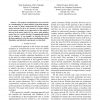923 search results - page 66 / 185 » Simulating Social Phenomena |
IROS
2007
IEEE
14 years 3 months ago
2007
IEEE
— We propose Computational Sensor Networks as a methodology to exploit models of physical phenomena in order to better understand the structure of the sensor network. To do so, i...
ICNC
2005
Springer
14 years 2 months ago
2005
Springer
Abstract. Humans have the ability to flexibly adjust their information processing strategy according to situational characteristics. However, such ability has been largely overloo...
ACRI
2004
Springer
14 years 2 months ago
2004
Springer
Cellular automata (CA) are highly parallel and discrete dynamical systems, whose behavior is completely specified in terms of a local relation. They were successfully applied for s...
MMB
2010
Springer
13 years 11 months ago
2010
Springer
Phase-type (PH) distributions are proven to be very powerful tools in modelling and analysis of a wide range of phenomena in computer systems. The use of these distributions in sim...
BIOSYSTEMS
2008
13 years 8 months ago
2008
Telomere shortening provides a molecular basis for the Hayflick limit. Recent data suggest that telomere shortening also influence mitotic rate. We propose a stochastic growth mod...

